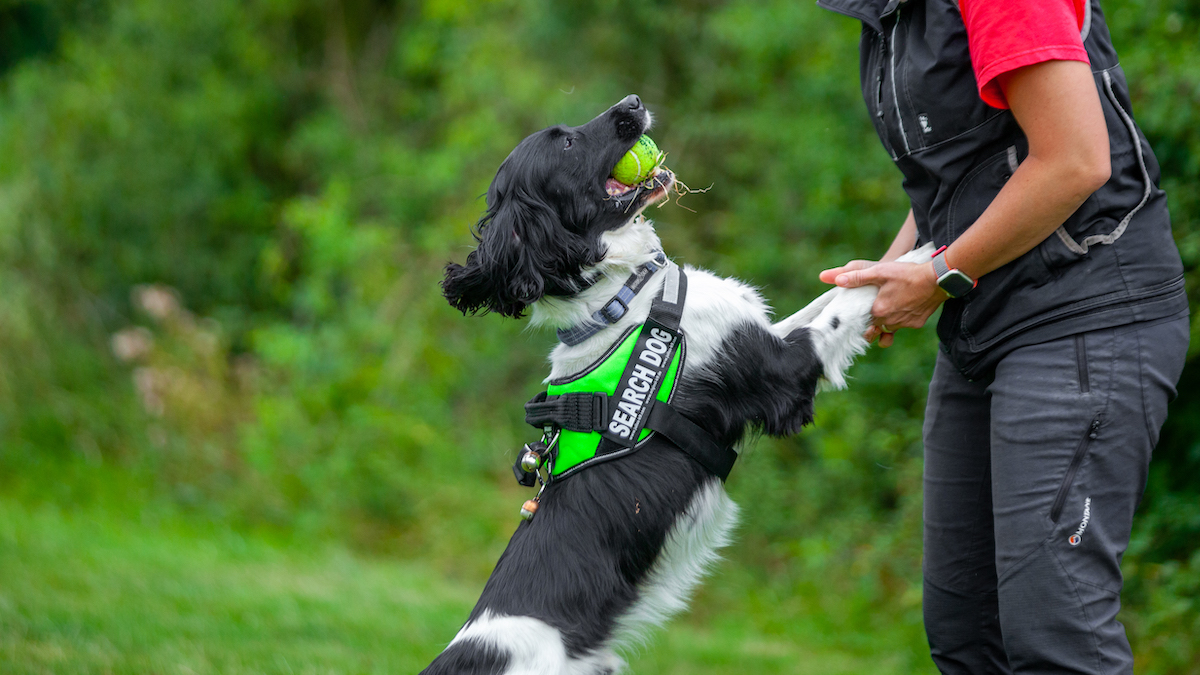Top Dog Training Mistakes to Avoid for Better Results
Top Dog Training Mistakes to Avoid for Better Results
Blog Article
The Ultimate Overview to Pet Dog Training: Change Your Pet dog's Habits
Effective dog training is necessary for cultivating an unified partnership in between family pets and their owners. This overview not just intends to furnish you with the necessary tools to transform your pet dog's habits yet likewise invites you to discover just how these fundamental ideas can lead to a deeper connection with your pet dog.
Recognizing Canine Behavior
Understanding canine actions is important for effective training and a harmonious connection between pet dogs and their proprietors. A dog's behavior is affected by a mix of genetics, atmosphere, and experiences. Dog training. Recognizing these elements permits owners to customize their training approaches to satisfy the private needs of their pets
Pet dogs connect primarily with body movement, vocalizations, and face expressions. For example, a wagging tail can show excitement or happiness, while a put tail may signal fear or submission. Observing these signs enables proprietors to react properly, strengthening favorable behaviors and resolving adverse ones effectively.
Furthermore, comprehending the social structure of pet dogs can offer understandings right into their actions. Dogs are pack animals, and they grow in a structured setting. Developing regular guidelines and clear borders can avoid confusion and promote a complacency.
In addition, recognizing the all-natural impulses of canines, such as the impulse to chase or dig, is crucial. These impulses can be rerouted via suitable electrical outlets, such as play or exercise. By thoroughly recognizing these behavioral facets, proprietors can foster a favorable training experience, inevitably leading to a well-adjusted and obedient canine friend.
Important Educating Strategies
Efficient canine training counts on a selection of important methods that can dramatically boost the learning process for both the proprietor and the dog. One basic technique declares reinforcement, which includes satisfying preferable actions with treats, appreciation, or play. This method encourages canines to repeat the habits that cause favorable results, promoting a relying on connection between the family pet and proprietor.
One more secret technique is uniformity in expectations and commands. Utilizing the exact same verbal signs and hand signals aids the dog understand what is called for, minimizing complication and promoting quicker learning. Additionally, developing clear borders and regulations is critical for efficient communication.
Socialization is also a vital element of training. Exposing pet dogs to different environments, individuals, and various other animals helps them create proper social skills and decreases anxiety in strange circumstances.
Lastly, patience and timing are essential. Educating sessions ought to be brief yet constant, making certain that the pet dog stays involved and receptive. By using these vital techniques, proprietors can produce a organized and positive training experience that advertises good behavior and strengthens the bond with their canine friends.
Creating an Educating Schedule
Just how can a well-structured training timetable improve a dog's understanding experience? A training schedule gives consistency, ensuring that pets get normal, focused direction. This predictability helps canines recognize what is anticipated of them, enhancing their discovering and permitting for much better retention of commands and actions.
When producing a training timetable, it is necessary to take into consideration the canine's age, type, and individual character. Youthful pups may profit from his comment is here much shorter, more regular sessions, while grown-up dogs may love longer, much less frequent training periods. Integrating a range of activities can likewise keep the sessions engaging, stopping boredom and promoting excitement for learning.
Additionally, scheduling training sessions at particular times of the day can help solidify a routine. Matching training with daily strolls or play can produce a favorable organization with discovering. It is additionally important to include time for reinforcement, such as treats or praise, to reward preferred habits immediately.
Last but not least, adaptability is vital. While uniformity is vital, being versatile to the dog's mood or power degree can boost their learning experience. A well-crafted training timetable inevitably lays the structure for efficient communication and a more powerful bond in between the pet dog and proprietor.
Common Educating Obstacles
Regardless of having a well-structured training timetable, pet proprietors commonly experience numerous challenges during the training process. One common issue is inconsistency in cues and commands. When numerous member of the family make use of various terms or tones, a dog may come to be baffled, impeding its ability to find out properly.
An additional regular challenge is disturbance. Dog training. Pet dogs are normally curious creatures, and outside stimuli such as various other animals, noises, or individuals can divert their interest throughout training sessions. This needs proprietors to create a regulated atmosphere or gradually present interruptions to enhance focus
In addition, varying power levels can influence training results. High-energy dogs may struggle to settle and concentrate, while much more easygoing breeds could need added motivation to engage. Customizing the training approach to fit the private dog's character is important for success.

Building a Strong Bond
A strong bond between a canine and its proprietor is essential for successful training and overall wellness. Dog training. This connection promotes trust fund, which is essential for effective communication during the training process. When a canine feels safe and secure and linked to its proprietor, it is extra most likely to respond favorably to signs and commands
To develop this bond, consistency is essential. Establishing a regimen that consists of normal feeding, workout, and training sessions assists produce a feeling of stability. Furthermore, positive reinforcement strategies, such as deals with, appreciation, and play, enhance wanted habits while enhancing the emotional connection.
Socialization is another vital facet of bond-building. Revealing your pet dog to different environments, people, and other pets aids them feel much more certain and comfy, improving the bond with their proprietor. Involving in activities together, such as strolling, playing bring, or joining obedience training, promotes teamwork and common enjoyment.
Verdict

Recognizing dog habits is essential for efficient training and an unified relationship between pets and their owners.Efficient pet training relies on a range of crucial techniques that can dramatically improve the learning process for both the proprietor and the pet dog.Despite having a well-structured training schedule, pet dog proprietors often experience different obstacles during the training process.In conclusion, efficient pet dog training depends on a thorough understanding of canine behavior, the application of necessary strategies, and the facility of an organized training timetable. By emphasizing positive support and uniformity, pet proprietors can dramatically improve their animals' actions, eventually making sure an unified partnership and advertising the health of Source both the pet and its environment.
Report this page